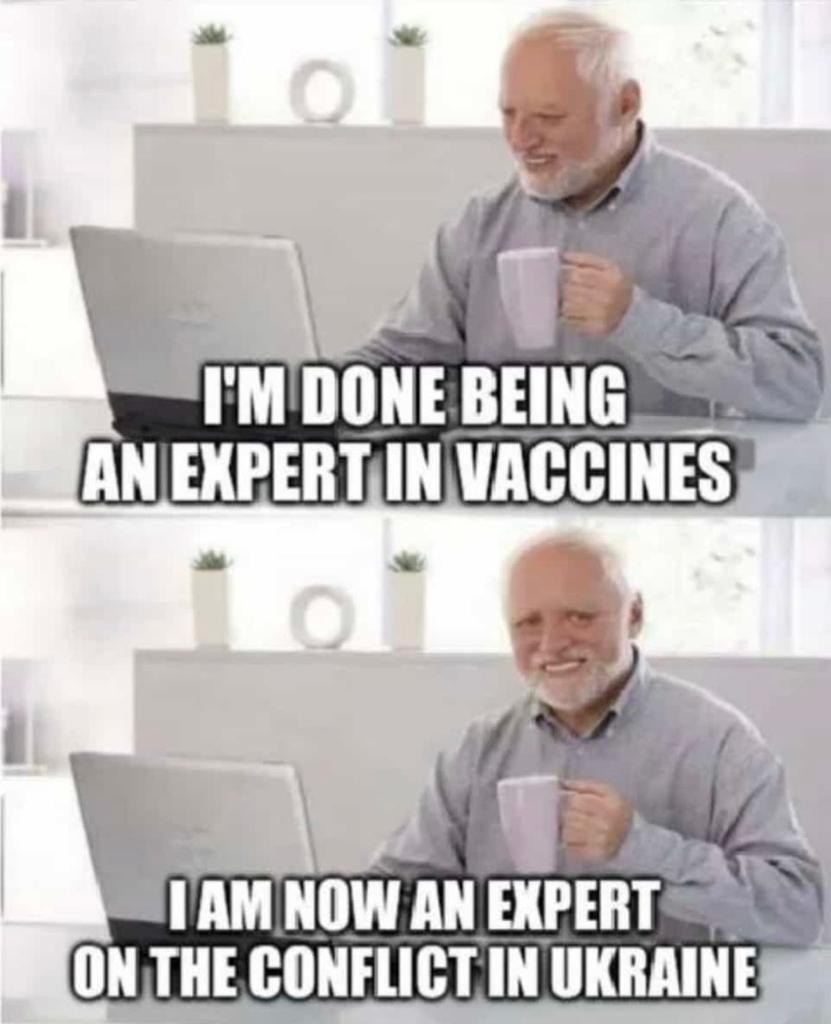Zographos
Minister without Portfolio
- Joined
- Dec 14, 2018
- Messages
- 46
- Location
- The Rock of the Mad Dogs
This is something I have noticed since the prophetic year of 2020 and the advent of the Covid-19 pandemic in particular. It has continued unabated into 2024 and will no doubt most likely stretch out until the crack of doom given the ever increasing information technology revolution that is still ongoing. To sum it up in a simple phrase, it would be "Everyone's an expert nowadays." The democratisation of the rollout of the internet worldwide, the advent of smartphones we can hold in the palm of our hands and the dissemination of information via the relatively new phenomenon of social media have all combined top create a perfect storm of misinformation, "expert" opinion, wildcat conspiracy theories, AI fakery etc. I know that the Internet is largely still governed by the law of the jungle and that despite new legislation like the Online Safety Act 2023 in the UK and the existing defamation laws there is still a problem with anonymous people sharing disinformation, propaganda and the purest libel worldwide. It's very difficult for individual sties, social media companies etc. to govern and police everything that is posted, shared and uploaded to the internet, to say nothing of the nefarious activities on the Dark Web. I think we have arrived in this unenvious position of the writ of the internet run wild due to the democratising effects of internet accessibility even in the farthest corners of the globe. The internet is a great Leveller and that can be both a blessing and a curse. There are pros and cons, just like anything else.
In the UK context the Iraq War of 2003, the Great Recession of 2007-2009, the MPs' Expenses Scandal of 2009, Brexit, the Covid-19 pandemic, Partygate, the rise of ring-wing populism and 40-year-high inflation and a cost of living crisis have no doubt all played a part in stripping away respect and faith in politicians, institutions, the monarchy, the Establishment and elites, the world of finance, medicine and so on. It's all part of a slow drift in society from perhaps the time of the Profumo Scandal in 1963 onwards that has seen as increasingly dangerous cynicism and world-weariness with authority figures and the mainstream media which is increasingly viewed as their puppet and official mouthpiece a la Joseph Goebbels' control of the press in Nazi Germany. Did the rot of public distrust in the UK Government perhaps even set in earlier than that during the Suez Crisis of 1956? In 2023 in the UK, as one recent example, the mass speculation about the disappearance of the tragic Nicola Bulley and all the various true crime documentary inspired theories about her "murder", "kidnap" and other unfounded and malicious rumours perfectly illustrates where we are nowadays in terms of the democratisation of news delivery. We have seen a shift away from traditional formerly trusted media sources like the BBC or ITV and a move towards TikTok etc. and influencers and commentators on social media, particularly amongst the young. You could say that Dr Google and his ilk cures all ills or at least "he" gives that false impression...
So what do we think of these musings of mine? Do you agreed, disagree or are you indifferent to the seemingly inevitable decline towards a lowest common denominator form of the internet?

In the UK context the Iraq War of 2003, the Great Recession of 2007-2009, the MPs' Expenses Scandal of 2009, Brexit, the Covid-19 pandemic, Partygate, the rise of ring-wing populism and 40-year-high inflation and a cost of living crisis have no doubt all played a part in stripping away respect and faith in politicians, institutions, the monarchy, the Establishment and elites, the world of finance, medicine and so on. It's all part of a slow drift in society from perhaps the time of the Profumo Scandal in 1963 onwards that has seen as increasingly dangerous cynicism and world-weariness with authority figures and the mainstream media which is increasingly viewed as their puppet and official mouthpiece a la Joseph Goebbels' control of the press in Nazi Germany. Did the rot of public distrust in the UK Government perhaps even set in earlier than that during the Suez Crisis of 1956? In 2023 in the UK, as one recent example, the mass speculation about the disappearance of the tragic Nicola Bulley and all the various true crime documentary inspired theories about her "murder", "kidnap" and other unfounded and malicious rumours perfectly illustrates where we are nowadays in terms of the democratisation of news delivery. We have seen a shift away from traditional formerly trusted media sources like the BBC or ITV and a move towards TikTok etc. and influencers and commentators on social media, particularly amongst the young. You could say that Dr Google and his ilk cures all ills or at least "he" gives that false impression...
So what do we think of these musings of mine? Do you agreed, disagree or are you indifferent to the seemingly inevitable decline towards a lowest common denominator form of the internet?


